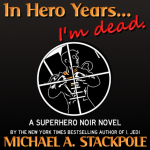The Future of Digital Publishing
I got a call from a writer friend last evening. We spoke about digital books and I answered some questions about why I had chosen which formats to sell through my store. We discussed sales strategies and how I’d seen things evolving. And then he offered a comment:
“I just have this feeling that somewhere out there, there is one more change, that none of us can foresee.”
He’s not the only author I’ve heard express this sort of reservation. Every time I’ve heard it, I’ve been struck that somewhere, sometime, some one standing on the top of a burning building has looked down at the airbag below, and just before jumping has said, “You know, I think there might be a better spot to land, and I’m sure I’ll see it very shortly.” (Note: these folks are different from the ones who perished two floor below because they were pretty sure that the sprinklers that had failed up to this point, would kick in at any moment and save them.)
When he made that comment, I said, “Here’s the problem with that: to affect such a change would take a lot of money and the investment of a lot of time. I just don’t see anyone out there doing that.”
Look at the players in the digital book game, the folks who have enough money and expertise to actually be able to change things from the path they’re on:
Google: They’ve invested a lot of money and time digitizing books in the currently available formats. They’ve made their play.
Amazon: Market leader, they’re making move to solidify their grip on digital publishing.
Barnes & Noble: They’re shrinking shelf space and are ahead of schedule with Nook and ebook sales.
Apple: Critics may call the iBookstore a flop, but every book sold in it is one more that Apple hadn’t sold before, and the dominate the tablet market.
Sony, Microsoft and other reader or tablet manufacturers: They’re all struggling to catch up with Apple and Amazon, and are making devices that support both epub and Kindle formats.
Smart Phone manufacturers: They’re in the same boat as the tablet producers. Letting folks read books is just one more thing their devices do, so they don’t need to innovate on that front.
Trade Publishers: By clinging to the traditional distribution model, they have fallen seriously behind the curve. Their suppliers (authors) and their true customers (readers) realize they don’t need them anymore. The idea that they serve as gatekeepers has fallen to the wayside and has been replaced by free sample chapters so readers can make their own decisions. The “legitimacy” offered by Trade Publishers has also vanished because they’ve turned around and offered contracts to self-published digital stars so the traditional publishers won’t seem so terribly out of touch. It’s akin to some segregated country club electing an African-American club president so it can seem that they’re not still mired in the past. That doesn’t mean the writers aren’t good, it just means that Traditional Publishing’s crown is seriously tarnished. Traditional publishers lack the money, personnel, vision and drive to become players in the digital market. There is no way they are going to move it in a different direction.
All the above cases leave us with one more suspect: The Unknown Player. This is the ubiquitous “someone” who will do “something” to somehow “change” everything. Right now, inside track is on Santa, since he delivers all the cool devices for free, and that’s the sort of universal cost and delivery system we’d need to make such a change. The digital book market has built up a lot of momentum and is making a lot of money for a lot of folks who are now invested in seeing this expansion continue so they can profit without having to invest a boatload more money in research, development and advertising.
What’s important to remember is this: you can either wait of the future to happen, or you can look at the future you want, and make it happen. There are no other choices here. Me, I looked at the future four years ago, and I worked to make it happen. I’m still working to make it happen. The cool thing is that while it’s happening, I am able to profit.
Suggesting that there may be one more change out there invites folks to wait. They want to wait because they want to be sure they get it absolutely right. But this is akin to suggesting that if you want to make money betting on American Football, you place your bet only on the Superbowl. Whereas I’d prefer to be placing bets throughout the season, refining my strategies, so when we get to the Superbowl, my bet is one that will be made because of knowledge and experience.
Don’t let the fear of not finding the perfect solution keep you from participating in some mighty dandy ones going on now. Only by working yourself into this new digital delivery economy will you be poised to maximize your earnings as it speeds up. Assuming that you can wait for the final form and just jump on then is like assuming that when you first learned to write, your work would hit the bestseller lists. That would have been stupid then, just as waiting is stupid now.
Don’t wait for the future, make it.
Writing up this series of blog posts is cutting into my fiction writing time. If you’re finding these posts useful, and haven’t yet gotten yet snagged my latest novels, please consider purchasing a book. Nice thing about the new age of publishing is that you become a Patron of the Arts, letting writers know what you’d like to see more of simply by voting with a credit card. (Authors charge less when they sell direct, so you save, we make more, and that frees us to write more.)
 My latest paper novel, At The Queen’s Command, is available at book retailers everywhere.
My latest paper novel, At The Queen’s Command, is available at book retailers everywhere.

My digital original novel, In Hero Years… I’m Dead is available for the Kindle and in the epub format for all the other readers, including the Nook, iPhone, iPod Touch and iPad. (Imagine the Batman, Watchmen and Kick-Ass movies all rolled into one, as written by Dashiell Hammett, and you’ve pretty much got the idea of the book. Oh, and with some satire and political commentary slipped in for irony.)



 07. May, 2011
07. May, 2011 








16 Responses to “The Future of Digital Publishing”